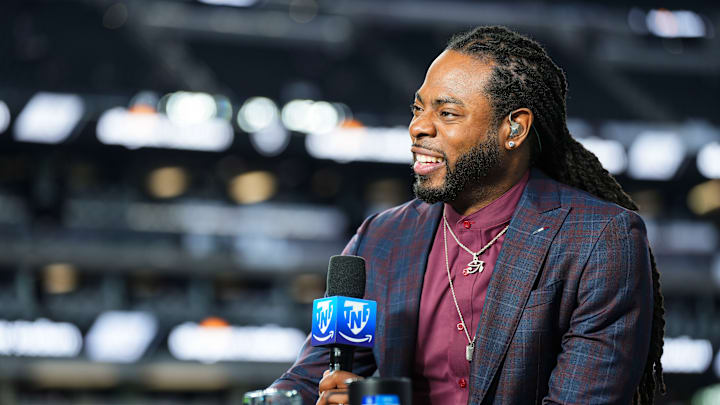The NFL will install some new rule changes going forward, and former 49ers cornerback Richard Sherman isn't a fan of one of them.
The offseason is always a provocative time for the NFL, particularly at that point when the league's competition committee gets together to discuss and review rule changes that have been proposed by one or more teams.
Entering 2024, a couple of noteworthy rules are going to be changed.
One of them focused on what's called the "hip-drop tackle rule," which was proposed to prevent defenders from wrapping up opposing ball-carriers at the hip and then falling to the ground. In slow motion, it's possible to see how this might be an unnecessary and avoidable tackling method.
But, in real time, it's notably difficult to prevent and avoid. Especially when smaller defenders are trying to bring down bigger, stronger ball-carriers.
Despite protests by the NFL Players Association, the new rule was adopted at the Annual League Meeting, according to Tom Pelissero of NFL Network:
No surprise here, despite the NFLPA’s objections. The NFL made clear it wanted what it calls the swivel hip-drop tackle out of the game, and now it is. Expect more fines than flags as the league and coaches work to remove the technique. https://t.co/HsD1rGkiry
— Tom Pelissero (@TomPelissero) March 25, 2024
Needless to say, there'll be plenty of complaints by defenders who are already viewed as having the competition stacked against them in recent seasons.
And that includes one former San Francisco 49ers cornerback, Richard Sherman.
Richard Sherman protests new rule banning 'hip-drop tackle'
Sherman, whose Niners tenure ended after 2020, has been more than just a little vocal about recent rule changes over the last few years, particularly those that make a defender's life more difficult.
In a series of tweets in Twitter/X, Sherman echoed such sentiments, primarily in response to other players who were analyzing the rule change:
I just wish they forced the entire Competition committee to create examples of how they expect a Defender to tackle a ball carrier. I want them to act it out at full speed and create a video for the players. At some point during the creation of that video they will realize how…
— Richard Sherman (@RSherman_25) March 20, 2024
Brother I’m at a loss for words. Guys going to have to make a decision to either allow them to drag them to the first down or give it by penalty. Ruining the game https://t.co/T1H7dzBmuw
— Richard Sherman (@RSherman_25) March 20, 2024
Brother as respectfully as I can I have to disagree. You were bigger and stronger than just about everyone you tackled so I can see your perspective. But as DB we run into TEs and RBs that outweigh and out strength us. So when we wrap and they are dragging us we must drop our… https://t.co/IrPU7jGNAZ
— Richard Sherman (@RSherman_25) March 20, 2024
Sherman pointed out how difficult this rule change will be for smaller defensive backs who are outweighed by bigger players, particularly tight ends and running backs. It's a commonly used technique that helps mitigate the size differential.
Now, it's not going to be permitted. And the penalty will be for 15 yards and an automatic first down for the offense.
NFL adopts new rule for challenges
While not as high-profile a rule change as the hip-drop tackle being banned, the NFL is also adopting a change that coaches and teams will probably like.
According to Jonathan Jones of CBS Sports, teams can now get a third challenge if only one of their two previous challenges were successful:
The NFL has approved a change to its challenge rules. A team now gets a third challenge if just one of their earlier two challenges was successful. Lions proposed the rule.
— Jonathan Jones (@jjones9) March 25, 2024
Previously you only got a third if both of your challengers were successful. There is no fourth challenge
Read more: 16 former Niners who remained unsigned in NFL free agency
The prior rule required both challenges to be successful in order for a third to be granted.
Reviews handled by the booth (within the final two minutes of a game's half or in overtime) will not change.
